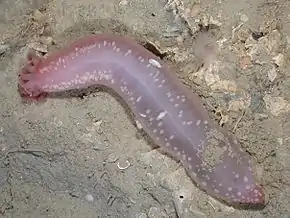Chiridota
Chiridota est un genre d'holothuries (concombre de mer) de la famille des Chiridotidae.
Chiridota
.jpg.webp)
Une Chiridota (possiblement C. rigida observée dans son environnement naturel à la Réunion.
| Règne | Animalia |
|---|---|
| Embranchement | Echinodermata |
| Sous-embr. | Echinozoa |
| Classe | Holothuroidea |
| Ordre | Apodida |
| Famille | Chiridotidae |
- Cheirodota
- Chirodota
Liste des espèces
Selon World Register of Marine Species (9 juillet 2014)[3] :
- Chiridota albatrossii Edwards, 1907
- Chiridota aponocrita Clark, 1920
- Chiridota carnleyensis Mortensen, 1925
- Chiridota conceptacula Cherbonnier, 1963
- Chiridota discolor Eschscholtz, 1829
- Chiridota durbanensis Thandar, 1997
- Chiridota exuga Cherbonnier, 1986
- Chiridota fernandensis Ludwig, 1898
- Chiridota ferruginea (Verrill, 1882)
- Chiridota gigas Dendy & Hindle, 1907
- Chiridota hawaiiensis Fisher, 1907
- Chiridota heheva Pawson & Vance, 2004
- Chiridota hydrothermica Smirnov & Gebruk, 2000
- Chiridota ingens Joshua, 1914
- Chiridota intermedia Bedford, 1899
- Chiridota kermadeca O'Loughlin & VandenSpiegel, 2012
- Chiridota laevis (O. Fabricius, 1780)
- Chiridota lumbricoides Eschscholtz, 1829
- Chiridota marenzelleri Perrier R., 1904
- Chiridota nanaimensis Heding, 1928
- Chiridota nigra Mortensen, 1925
- Chiridota ochotensis Savel'eva, 1941
- Chiridota orientalis Smirnov, 1981
- Chiridota pacifica Heding, 1928
- Chiridota peloria Deichmann, 1930
- Chiridota pisanii Ludwig, 1887
- Chiridota regalis Clark, 1908
- Chiridota rigida Semper, 1867
- Chiridota rotifera (Pourtalès, 1851)
- Chiridota smirnovi Massin, 1996
- Chiridota stuhlmanni Lampert, 1896
- Chiridota tauiensis Savel'eva, 1941
- Chiridota uniserialis Fisher, 1907
- Chiridota violacea (J. Müller, 1849)
 Chiridota heheva, une holothurie abyssale.
Chiridota heheva, une holothurie abyssale._Figure_11.jpg.webp) Chiridota rotifera, avec le détail de ses spicules.
Chiridota rotifera, avec le détail de ses spicules.
Espèces fossiles
Selon Fossilworks, il y a trois espèces fossiles du Carbonifère du Royaume-Uni et de l'Éocène de la France:
- †Cheirodota traquairii Etheridge, 1881[4] (syn. Protocaudina traquairii)
- †Chiridota atava Waagen, 1867[5]
- †Chirodota vetusa Schwager, 1865[6]
Une autre espèce fossile est :
- †Chiridota elegans Malagoli, 1888 (syn. †Chirodota elegans)[7] (Pliocène)
Références taxinomiques
- (en) Référence World Register of Marine Species : taxon Chiridota Eschscholtz, 1829 (+ liste espèces)
- (en) Référence Paleobiology Database : Chiridota Eschscholtz 1829
- (fr+en) Référence ITIS : Chiridota Eswchscholtz, 1829
- (en) Référence Animal Diversity Web : Chiridota
- (en) Référence uBio : Chiridota Eswchscholtz, 1829
- (en) Référence Catalogue of Life : Chiridota (consulté le )
- (en) Référence NCBI : Chiridota (taxons inclus)
Notes et références
- (de) F. Eschscholtz. 1829. Zoologischer Atlas; enthaltend Abbildungen und Beschreibungen neue Thierarten wahrend der Flottcapitains von Kotzebue zweiter Reise um die Welt 1823–26. Reimer, Berlin 2:1-13
- ITIS, consulté le 9 juillet 2014
- World Register of Marine Species, consulté le 9 juillet 2014
- (en) R. Etheridge. 1881. On the presence of scattered skeletal remains of Holothuroidea in the Carboniferous limestone series of Scotland. Proceeding of the Royal Physical Society of Edinburgh 6:183-198
- (de) W. Waagen. 1867. Über die Zone des Ammonites Sowerbyi. Benecke's geognostische-paläontologische Beiträge 511-665
- (de) C. Schwager. 1865. Beiträge zur Kenntniss der mikroskopischen Fauna jurassischer schichten. Jahreshefte Vereins Vaterländ Naturkunde Württemberg 21:1-142
- Note paleontologiche sopra un Astrogonium e una Chirodota del pliocene. M Malagoli, 1888
- Portail des échinodermes
- Portail de la biologie marine
- Portail des abysses
Cet article est issu de Wikipedia. Le texte est sous licence Creative Commons - Attribution - Partage dans les Mêmes. Des conditions supplémentaires peuvent s'appliquer aux fichiers multimédias.